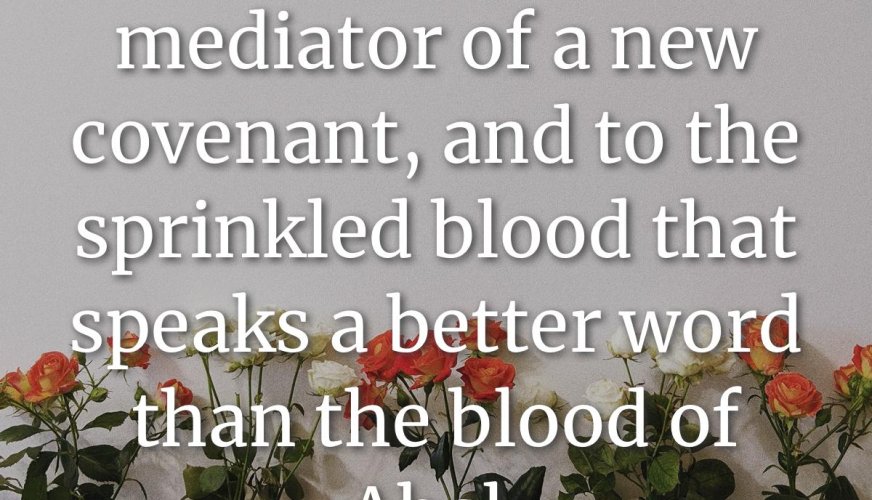A Clarification on the Reference in Hebrews: A Word-by-Word Study Jinu Ninan

A Clarification on the Reference in Hebrews: A Word-by-Word Study
Jinu Ninan
Since some readers pointed out that a reference in the book Hebrews: A Word-by-Word Study required further clarification, I am providing it here.
Hebrews 12:24 – “You have come… to Jesus, the mediator of the new covenant, and to the sprinkled blood that speaks a better word than the blood of Abel.”
In the book, it was mentioned that the reference here is not to Abel’s own blood crying out for vengeance, as is the common interpretation, but rather to the sacrificial blood that Abel offered.
Because some requested a fuller explanation of this point, it is given below.
(Grateful acknowledgment is due to those readers who carefully study the text and ask for such clarifications.)
=================================================================================
What does the author mean by “the blood of Abel”?
Why is the blood of Christ considered superior to the blood of Abel?
The general interpretation is that “the blood of Abel” refers to his own blood crying out for vengeance.
But if we carefully study the epistle, we understand that the reference is actually to the blood of the sacrifice Abel offered. Three main reasons for this are explained below.
=================================================================================
1. The Context of the Passage
=================================================================================
The context of this verse, and indeed of the whole letter, is the contrast between the old covenant and the new covenant.
Throughout the epistle and this chapter, the writer of Hebrews emphasizes that Christ’s offering of His body is superior to the sacrifices of the Old Testament, and that His blood is superior to the blood of sacrificial animals.
The first sacrifice mentioned in Scripture is that of Abel. What was the uniqueness of Abel’s offering? Why does the author say Abel’s sacrifice was “better” than Cain’s?
The writer himself explains this earlier: Hebrews 10 closes by stressing that “the righteous shall live by faith” and that the promises are inherited through faith. Then in chapter 11, faith is described as “the assurance of things hoped for, the conviction of things not seen.” Immediately after this, Abel is introduced as the first person in history who pleased God by faith, offering his sacrifice in faith.
Thus, the reason God accepted Abel’s offering and rejected Cain’s is clearly explained: Abel’s offering was made by faith. This faith was not general but specifically in the promise of the ultimate sacrifice of Christ, given to Adam and handed down through the generations. The patriarchs, beginning with Abel, lived in hope of that promise.
Therefore, Abel’s sacrifice, in which blood was shed, was a shadow of the perfect sacrifice of Christ, the spotless Lamb foreordained before the foundation of the world.
By faith Abel gave the best of what he had, and God accepted both Abel and his offering. In this way Abel was declared righteous by faith.
Scripture confirms that all the Old Testament believers were justified in this same way—by faith. Thus Abel, though dead, still speaks through his faith. His blood continues to testify—not of vengeance, but that “the righteous shall live by faith.”
=================================================================================
2. The Word “Better”
=================================================================================
The word “better” itself indicates that the author is referring to Abel’s sacrificial blood, not his own blood of vengeance.
Throughout the letter to the Hebrews, “better” is a key word—used thirteen times. It is always employed to show that something good is surpassed by something greater.
The author demonstrates to Jewish believers that Christ is superior—better than prophets, angels, Moses, Joshua, the Levitical priesthood, the old covenant, and the animal sacrifices that could never remove sin.
If Abel’s blood meant simply the cry of vengeance, it could not be called something “good” to be compared with Christ’s sacrifice. But if it refers to Abel’s offering in faith, then the comparison holds: Christ’s blood is better, infinitely surpassing.
=================================================================================
3. Cleansing Power of Christ’s Blood
=================================================================================
Finally, Hebrews 12:24 speaks of Christ’s blood as “the sprinkled blood that speaks a better word.” This clearly points to its cleansing power.
Hebrews 9:13–14 explains that while the blood of goats and bulls sanctified for external purification, “how much more will the blood of Christ… cleanse our consciences from dead works to serve the living God!”
Animal sacrifices could never remove sin—they only covered it temporarily. But the blood of Christ removes sin completely, cleanses the conscience, redeems us eternally, and gives us a new heart.
This is why John the Baptist proclaimed: “Behold, the Lamb of God, who takes away the sin of the world!” Christ’s blood enables us to enter boldly into the presence of God, cleansed and sanctified, to worship Him in spirit and truth.
Conclusion
Thus, the “blood of Abel” represents the sacrifices of the old covenant, which could never take away sin. In contrast, the blood of Christ—the blood of the new covenant—speaks better things, for it brings true cleansing, eternal redemption, and the complete removal of sin.
